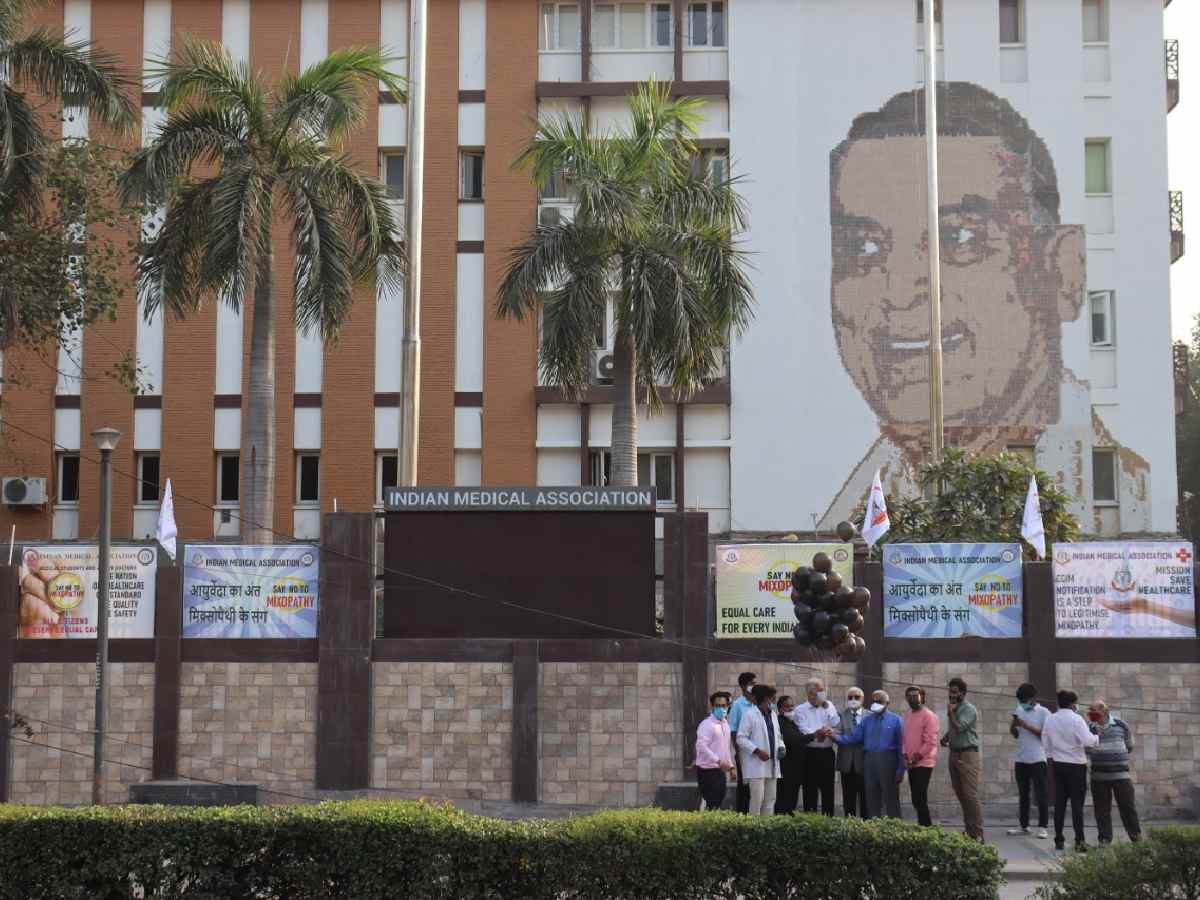
ICONIC: The Indian Medical Association House building, a cornerstone of the medical community, is now set for redevelopment
ITO: As you step inside the Indian Medical Association (IMA) House at Indraprastha Estate, you are greeted by a plaque—the foundation stone of the IMA building, laid by the first President of India, Dr Rajendra Prasad, on September 19, 1958. This plaque, inscribed in both Hindi and English, commemorates Dr Prasad’s appeal to the medical fraternity to pay special attention to the service of the poor and to research.
The building was completed and inaugurated by the then President of India, Dr S Radhakrishnan, on September 6, 1964.
A historic transition
Fast forward to the present: Sixty six years after Dr Prasad’s visit, the IMA House is set to be demolished. A brand new building is expected to rise in its place before 2028, coinciding with the IMA’s centenary celebrations.
“Indeed, the IMA House was a landmark building, and every member of the Indian medical fraternity was emotionally attached to it. As they say, there is an expiry date for all good things. That was also true for our IMA House. Hence, we decided to build a brand new state-of-the-art building, as we faced numerous difficulties in maintaining the old one. There were a plethora of issues with the old building,” informs Dr Vinay Aggarwal, former President of the IMA, who is overseeing the construction of the new IMA House.
Doctors from across the country frequently visit this historic building to participate in various programmes and seminars. “As our first IMA building is soon to be relegated to the pages of history, we all are emotional, as this is our second home.” The IMA building has also hosted functions for other organisations over the years.
Also read: Explained: Key factors behind spike in dengue
A legacy of medical service
The IMA House features a mural of Dr Bidhan Chandra Roy, the first Chief Minister of West Bengal and a freedom fighter. “For the medical community of India, Dr Roy will always remain our guiding force and hero,” says Dr Aggarwal.
Prior to 1949, the IMA headquarters was located in Calcutta. It was then decided that it should be situated in the capital. By the time the IMA relocated to Delhi, several medical institutions were already serving the people, including the Army Hospital Research and Referral (1922), Lady Hardinge Medical College and Hospital (1914), AIIMS (1956), St. Stephen’s Hospital (1885), and LNJP (1930). In addition, many renowned doctors in Delhi were providing care to patients.
State-owned National Building Construction Company (NBCC) has secured a Rs 66 crore order to redevelop the IMA House in the national capital. The new IMA House will be a seven-storey building.
“I am sure NBCC will double the underground parking space. All the old-style buildings on ITO have been facing a significant space crunch for parking cars. Moreover, it will be a disabled-friendly building,” says Ranjit John, an acclaimed architect who has redeveloped Jesus and Mary College and is set to redevelop St. Stephen’s College as well.
It is noteworthy that NBCC has been developing state-of-the-art office buildings, including the headquarters of the National Investigation Agency (NIA), Central Bureau of Investigation (CBI), and the new headquarters of the Central Information Commission (CIC) in the capital. NBCC has also redeveloped the Kidwai Nagar area.
Almost all the buildings on Indraprastha Estate, including the Accountant General of Central Revenue (AGCR), the Income Tax Department, and the Central Public Works Department (CPWD), were constructed either in the late 1950s or early 1960s. Perhaps the youngest building here is Vikas Minar, designed by Habib Rehman, which was completed in 1976. It is a 23-storey building housing the offices of the Delhi Development Authority (DDA).
Old-timers recall that when it was inaugurated, Vikas Minar was regarded as the tallest building in the capital, even surpassing the height of the Qutb Minar. Interestingly, Rehman also designed AGCR, the University Grants Commission (UGC), and the World Health Organization (WHO) buildings in the IP Estate area. It is important to note that when the WHO building was demolished a couple of years ago, there was outrage among history enthusiasts. They argued that the WHO building was outstanding and should not have been demolished.
With the IMA being redeveloped, there is a sense that this will trigger the redevelopment of other buildings in the IP Estate as well. “Redevelopment often leads to modernisation and upgrades, enhancing a building’s appeal. Modern and functional buildings attract new businesses and investment, stimulating economic growth in the area,” believes another architect.
SK Gambhir, an eminent income tax consultant in the capital, states, “I have been visiting the Income Tax office for the last 40 years or so. The building is in bad shape. Parking your car there is a significant headache. Due to the vagaries of time, it looks terrible. Hopefully, it will be redeveloped like the IMA House sooner rather than later.”
The writer is a Delhi-based senior journalist and author of two books ‘Gandhi’s Delhi: April 12, 1915-January 30, 1948 and Beyond’ and ‘Dilli Ka Pehla Pyar – Connaught Place
Delhi hosted what organisers describe as the world’s first player auction in golf, launching ‘72…
An elderly woman recalls how her six-year-old granddaughter lay bleeding after a speeding car hit…
Municipal Corporation of Delhi plans a unified policy enabling RWAs to adopt and maintain parks…
A 17-year-old boy allegedly died by suicide after jumping before a moving train at Uttam…
Delhi High Court grants bail to 26-year-old Thar driver accused of mowing down two in…
Two Rohini men arrested for fatally stabbing one person and injuring another during a robbery…